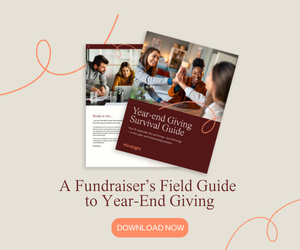AP Perspectives: How the COVID-19 Pandemic Changed the Meaning of Community

As shared widespread events, pandemics always spark societal shifts—plagues in the Middle Ages led to a renewed religious fervor in Europe, while the Spanish Flu of the early 20th Century led to the study of viruses and epidemics. In the same way, the COVID-19 pandemic has rapidly and irreversibly changed life for all of us. It gave us a heightened awareness of our dependence on each other, it rearranged our priorities, and it drew back the curtain on parts of our communities that we previously took for granted—like those who struggle to access health care and the health care heroes who make daily sacrifices for all of us.
The importance of health care and, indeed, social services of all kinds, has never been more prominent in the public consciousness. Today, translating that awareness into philanthropy is a crucial challenge facing fundraisers because the need to expand access to these services and resources has never been greater.
The great irony of the physical distance forced on us by the pandemic is how much it reminded us of our need for community. While we were in isolation, we sought out feelings of connection in many ways— by delivering groceries to seniors, participating in virtual support groups, holding drive-by birthdays, making donations to community organizations, waiting sleepless nights by patients’ bedsides and more. Now, it’s important that we draw on that need for togetherness to drive change in favor of healthier communities. Here are four ways the pandemic has changed the way people think about community—and what they mean for fundraisers moving forward:
• A heightened awareness of one another.
From a biological scale to an existential one, connection has been an impossible theme to ignore throughout the pandemic. After sacrificing in the name of our neighbors’ safety and bearing witness to the dedication of health care workers and home care providers, we all have a deeper understanding of our unavoidable interconnectedness and a heightened awareness of the struggles of others.
We also understand more than ever how even the smallest action— from wearing a mask to making a donation—can drastically impact the trajectory of not only another life, but an entire community. This is the mission that many now feel, and the message that fundraisers must speak to: how can you give benefactors the opportunity to contribute to the collective betterment of their entire community? When you open the door to that level of impact, you empower both the people you partner with and the people you serve.
• Deeper connections and a desire for a more personal touch.
Extended isolation has left us both yearning for connection and relearning how to navigate life around others. At the height of the pandemic, 53% of adults in the United States reported negative impacts on their mental health, 26% reported stress-related health symptoms and over 50% felt lonelier. Today, people are at once more in need of personal connection than ever and less confident in how to achieve it.
During the pandemic, virtual communication actually broke down many barriers, inviting us all into one another’s homes where we bonded over our strange, shared experience. We were inevitably interrupted by pets, spouses and kids, and we got a less formal glimpse into each other’s personal selves. We also learned that video calls can be meaningful experiences, when conducted in the right way, and this realization broadened the tools and perspectives of fundraisers.
Now that people are hungry for in-person connection, these relationships that were built or deepened during the pandemic enable fundraisers to create unique moments of connection with benefactors. The lingering Zoom fatigue of 2020 means that a return to basics—from handshakes and handwritten notes to shared morning coffees and in-person events—is more effective than ever at connecting with donors to help them make a difference.
• Shifts in internal culture.
As fundraisers, a deeply important piece of our job is building the trust needed among our internal teams for everyone to stay equally engaged and committed to the work our communities need us to do. There’s no question—that’s more difficult to do virtually. As leadership guru Simon Sinek wrote, “Trust isn’t formed in meeting rooms or in conference calls; it’s built when we’re able to connect on a personal level outside our normal work obligations.” It takes a concerted effort to create online spaces where we can engage in the kinds of casual discussions we used to make when passing each other in the hall.
Though the shift to virtual environments made this an intimidating challenge at the beginning of the pandemic, overcoming that challenge together brought many nonprofit teams closer.
When our daily social interactions were cut off, virtual meetings with co-workers naturally became more open, more self-deprecating, more personal. Out of the unavoidable peek into one another’s personal lives during the pandemic came an incredible bond among nonprofit teams who turned to each other to share in the unique experience of balancing their own anxieties, the logical challenges of safety and social distancing and the compounding needs of their communities.
This strengthened bond can be harnessed for greater impact in our communities: the more personally invested your team is in one another, the deeper the commitment they share to your cause—and the better they’re able to enlist benefactors to that cause as well.
• Greater gratitude.
When crisis hits—whether on a personal scale or a global one—our priorities suddenly narrow to the things most important to us: our faith, our families, our security, our basic needs. During the pandemic, this narrowed focus manifested in many ways through acts of gratitude: people increased their charitable donations by as much as 25% and volunteering surged across the globe. Gratitude is the genesis of philanthropy, and as fundraisers our work has always been about building bridges from gratitude to real-world impact.
In this unique moment, gratitude is not just at the forefront of everyone’s minds, it’s a common thread that bonds us all: gratitude for our loved ones, gratitude for our resources, gratitude for health care workers and countless others who carried us through. By honoring, expressing and cultivating gratitude in every interaction, fundraisers not only create deeper bonds with benefactors—they can also find ways to strengthen the connection between benefactors and their communities.
Lighting the Way Forward
The brightest light can rise from the darkest moments if we truly see it. The pandemic showed us, unquestionably, that we all have the individual power to change life for everyone in our communities—and that we all have a responsibility to consider how we’re doing so. This feeling of shared responsibility for the health and well-being of our communities was emphasized by the pandemic, and it’s a lesson we should continue to carry forward.
Fundraisers have a unique role to play in helping to make this happen. By encouraging private benefactors and local business leaders to lean into the ways that public priorities and perspectives have changed, we can help continue momentum around initiatives that uplift the most vulnerable among us.
About SSM Health Foundation – St. Louis
SSM Health Foundation – St. Louis was founded in 2018 to unify philanthropic efforts and elevate community impact for SSM Health DePaul Hospital – St. Louis, SSM Health Saint Louis University Hospital, SSM Health St. Claire Hospital – Fenton, SSM Health St. Joseph Hospital – Lake Saint Louis, SSM Health St. Joseph Hospital – St. Charles, SSM Health St. Joseph Hospital – Wentzville, and SSM Health St. Mary’s Hospital – St. Louis. The Foundation serves as a cohesive community of supporters, health care professionals, corporate leaders, community donors, and volunteers to make an impact on health care in the communities SSM Health serves across the region. Inspired by the mission of the founding sisters who, in 1872, began their ministry of healing with $5 and a basket to collect donations, the Foundation strives to serve by seeking financial support for SSM Health hospitals. For more information, please visit www.givetossmhealth.org.



